Transform your living room into a haven of tranquility with Feng Shui furniture placement; discover how it impacts your positivity and energy flow.
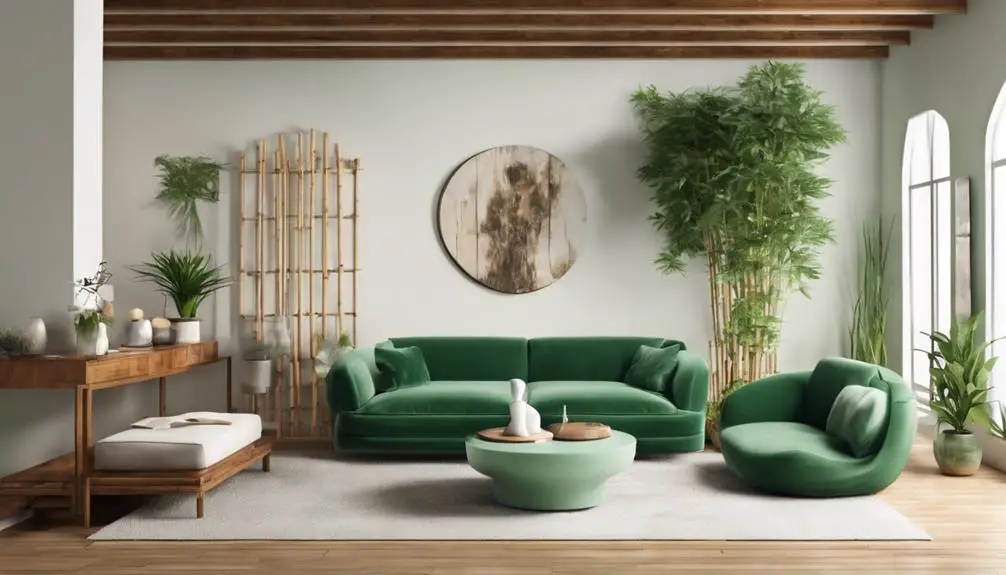
Feng Shui Furniture Living Room
In the chaos of everyday life, your living room can be an oasis of calm or a storm of disarray. Have you ever considered the role your furniture placement plays in creating this energy?
Feng Shui, an ancient Chinese system, suggests that how you arrange your furniture can impact the flow of positivity within your space. But it's not just about where you put your sofa or coffee table.
Intrigued? Stick around, there's much more to learn about transforming your living room using Feng Shui principles.
Key Takeaways
- Furniture placement in a living room should promote positive energy flow and facilitate traffic.
- Selecting furniture made from natural materials, preferably with curved edges, can enhance the Feng Shui energy.
- Color choices in the living room should balance Yin and Yang, influencing mood and energy positively.
- Incorporate Feng Shui decor elements representing Wood, Fire, Earth, Metal, and Water strategically to create harmony.
Understanding Feng Shui Basics
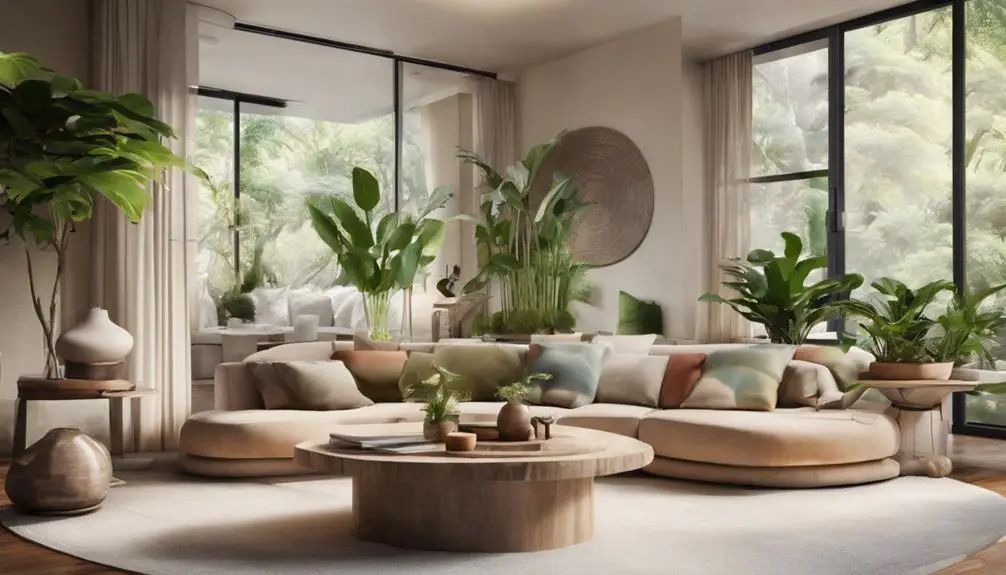
To fully appreciate the impact of Feng Shui furniture in your living room, you'll first need to grasp the fundamental principles of Feng Shui. This ancient Chinese art, with its roots deeply embedded in Feng Shui origins, is more than a mere design principle. It's a philosophy, a way of life that aims to harmonize individuals with their surrounding environment.
The principle concepts of Feng Shui revolve around the flow of 'chi' or energy. Imagine water flowing around rocks in a stream; it's this fluidity, this balance, you're looking to mimic within your own living space. Central to this, of course, is the concept of Yin and Yang, the duality that permeates all of life. It's about striking a balance, creating a space that's neither too masculine nor too feminine, too dark nor too light.
As you delve deeper into the world of Feng Shui, you'll encounter the Bagua, an energy map of your home that guides you in harnessing positive energy. Understanding these core concepts will help you to effectively incorporate Feng Shui principles into your living room décor, creating a harmonious and welcoming space.
The Importance of Furniture Placement
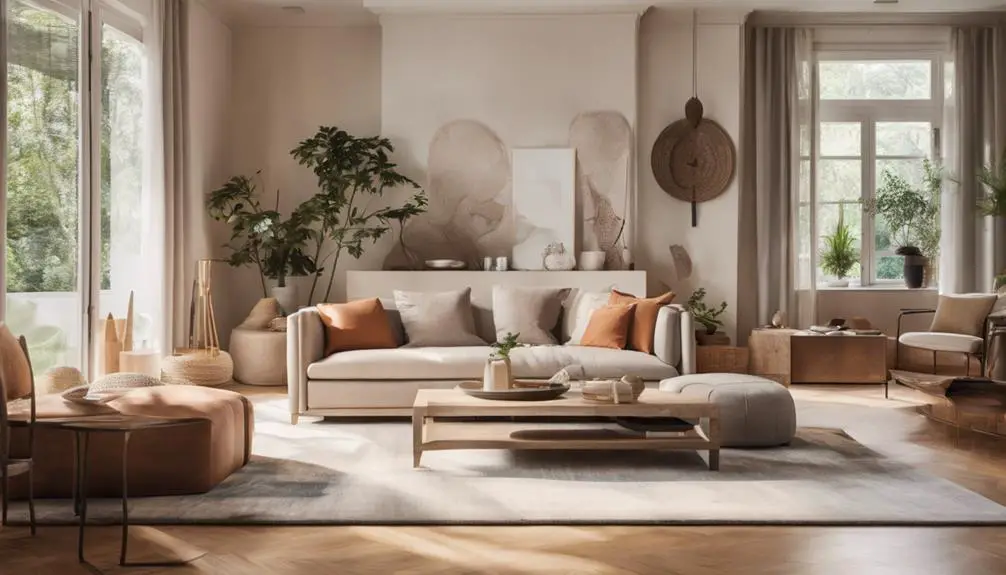
In the realm of Feng Shui, the arrangement of your furniture plays a pivotal role in channeling positive energy and encouraging harmonious living. Your furniture placement can either obstruct or facilitate traffic flow, thereby impacting the energy dynamics of your space.
Imagine walking into a room with a sofa blocking your path, causing you to detour awkwardly. This disrupts the smooth flow of energy, leading to a sense of imbalance and discomfort. On the contrary, a well-placed furniture piece can create an inviting pathway, encouraging the seamless movement of both people and energy.
Room balance is another crucial aspect of furniture placement. In Feng Shui, it's not just about physical balance, but also about achieving a harmonious blend of elements. Overcrowding one part of the room while leaving another empty can create a lopsided energy field. Strive for a balance that's visually pleasing and energetically harmonious.
Selecting Feng Shui-Friendly Furniture
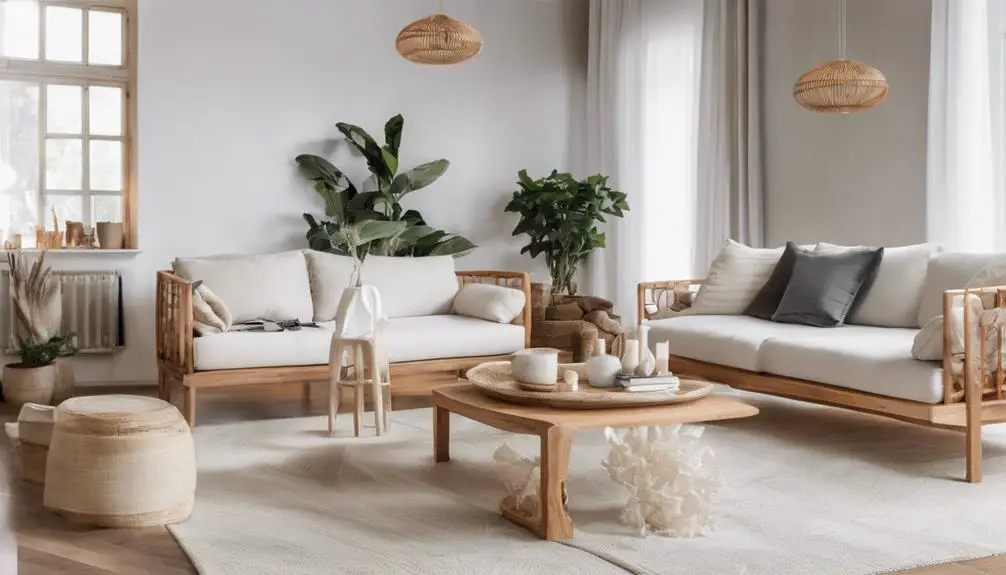
After achieving a harmonious arrangement, your next step is choosing furniture that aligns with Feng Shui principles, boosting positivity and balance in your living space. Material selection plays a significant role here. Feng Shui favors natural materials such as wood and stone, as they promote the flow of positive energy. So, when choosing your sofa, tables or shelves, you might want to steer clear of synthetic materials.
In addition, Feng Shui adheres to the concept of roundness for furniture selection. This means opting for furniture with curved edges rather than sharp ones. This not only reduces the risk of injury but it also creates a smoother flow of Chi (energy) in your space.
Sustainable practices are also paramount in Feng Shui. Furniture made from reclaimed or recycled materials is considered auspicious, as it respects the balance of the environment. This reinforces the Feng Shui concept of living in harmony with nature.
Color Choices and Their Influence
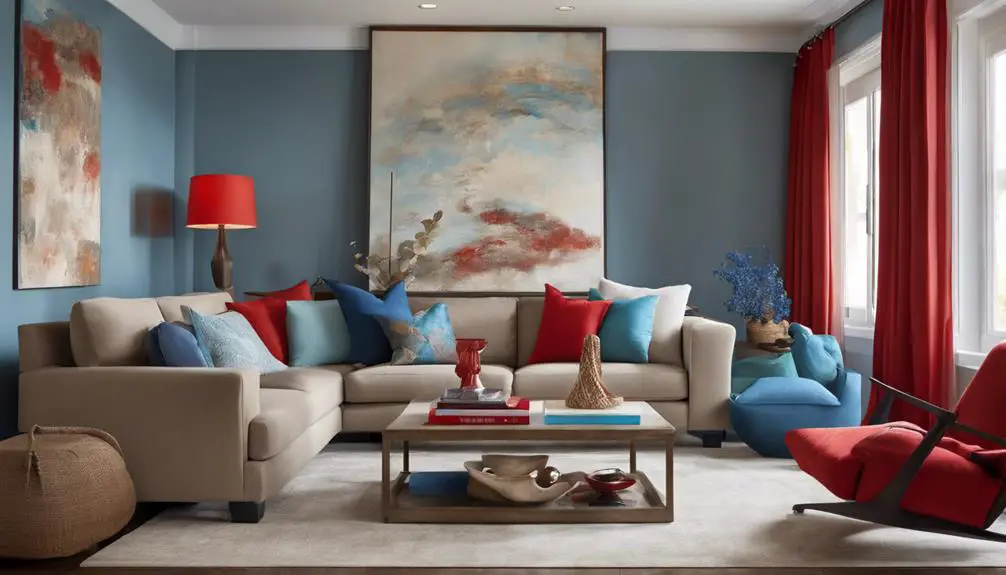
Delving into the realm of colors, you'll find they hold a significant sway in Feng Shui, influencing the energy and mood of your living room. Color psychology plays a crucial role in this. Each hue has a unique vibe, stirring different emotions and behaviors. Reds, for instance, are powerful and stimulating, while blues project tranquility, perfect for fostering calm conversations.
Harmony creation is another facet of Feng Shui where color plays a key role. You'll want to balance Yin (soft, dark, and cool colors) and Yang (bold, bright, and warm colors) in your living room to ensure a harmonious flow of Chi, or life energy. For instance, a fiery red sofa can be toned down with a cool blue rug, creating a balanced visual impact.
Incorporating Feng Shui Decor Elements
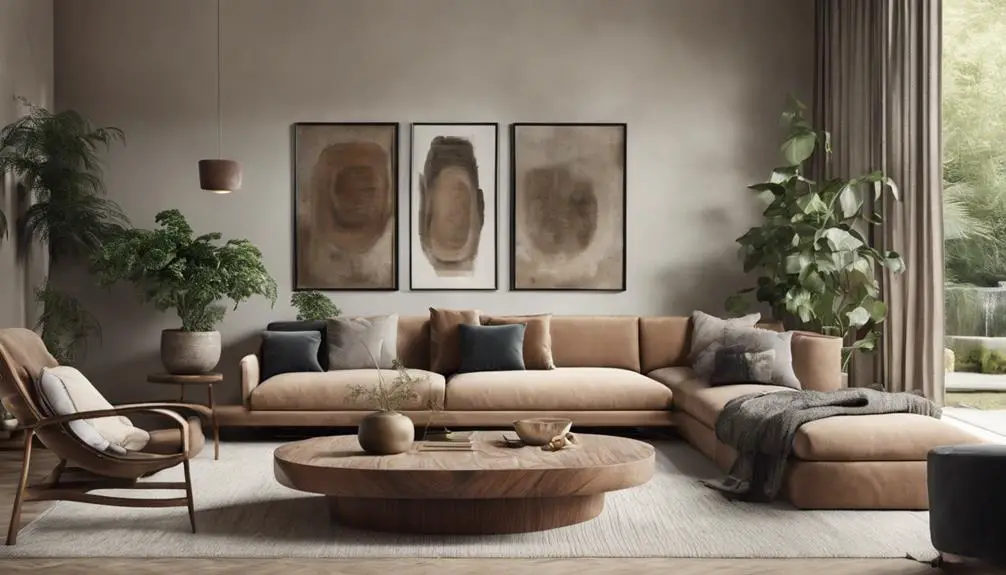
Now that you've understood the importance of color harmony in your living room, let's explore how to further enhance this space with strategic placement of Feng Shui decor elements. These elements not only add aesthetic value but also work towards balancing elements and enhancing energy flow in your living room.
In Feng Shui, there are five elements: Wood, Fire, Earth, Metal, and Water. Each represents different energy, and when combined, they create a harmonious environment. For instance, a wooden furniture piece can symbolize growth and creativity, while a metal decor item might bring clarity and preciseness.
Let's simplify this concept with a table:
| Feng Shui Element | Decor Item Example |
|---|---|
| Wood | Green Plants |
| Fire | Candles |
| Earth | Ceramic Vases |
| Metal | Silver Picture Frame |
| Water | Aquarium |
Remember to place these elements in appropriate areas of your living room to enhance positive energy flow. For instance, a wooden plant in the east can foster health and family relationships, while a metal item in the west can enhance creativity. As you incorporate these Feng Shui decor elements, you'll notice a significant improvement in the energy of your living room.
Practical Feng Shui Living Room Tips
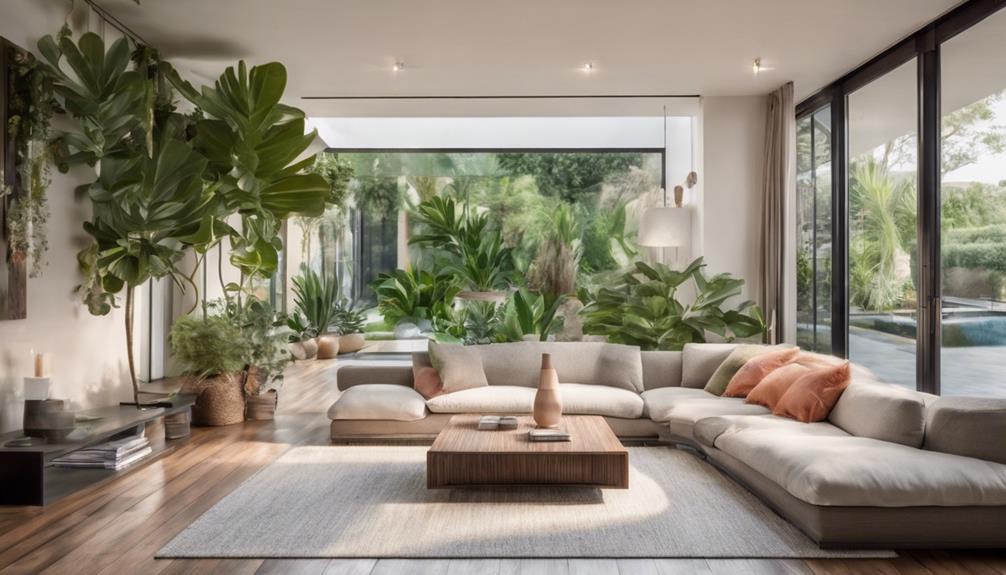
To truly transform your living room into a haven of positive energy, let's dive into some practical Feng Shui tips that you can easily apply. First, let's talk about lighting considerations. Feng Shui emphasizes the importance of balance, and lighting plays a critical role in achieving this. You'll want to ensure your space has a good mix of natural light during the day and warm ambient lighting in the evening. Dimmer switches can aid in creating a flexible, balanced lighting scheme. Avoid harsh overhead lights, which can create negative energy.
Next, let's focus on energy flow optimization. Start by decluttering your space. Open spaces invite positive energy to flow freely. Then consider the placement of your furniture. Aim for an arrangement that promotes easy movement and doesn't block doorways. Your sofa, for example, should face the door while not being directly in line with it. Mirrors can also be used strategically, to reflect energy around the room.
Frequently Asked Questions
What Are Some Feng Shui Practices Specifically for Small Living Rooms?
In a small room, your color choices and furniture placement are essential. Start with light colors to make the room feel larger.
You'll want your main furniture pieces facing the door, but not blocking it – that's key Feng Shui. Keep clutter to a minimum and arrange furniture in a way that promotes easy conversation.
Mirrors can also be used to create the illusion of space. Remember, balance is the goal – your room should feel comfortable and flow naturally.
Can Feng Shui Principles Be Adapted for People With Mobility Issues or Disabilities?
Yes, you can definitely adapt Feng Shui principles for inclusivity. It's all about creating an accessible arrangement that supports mobility and independence.
Consider implementing inclusive design, like furniture with adjustable heights and widths. Use clear paths for easy navigation, avoid clutter, and choose harmonious colors to promote calmness.
How Do I Maintain Good Feng Shui in My Living Room When I Have Children or Pets?
Balancing energies in your home, especially when you've got kids or pets, can be a challenge. Try using childproof decorations that enhance your space's positive energy.
Consider furniture placement—create clear paths for easy movement. Use colors that foster harmony. Make sure play areas are tidy and pet zones don't obstruct flow.
It's all about achieving a harmonious environment that's both safe and energy-balanced. You've got this!
Are There Any Feng Shui Principles for Choosing Electronic Appliances for a Living Room?
Yes, there are Feng Shui principles for choosing electronic appliances. Concerning electronic placement, you should avoid facing the TV towards the door.
It's also recommended to hide electronics when they're not in use. As for color influence, it's best to stick with neutral tones for large items.
How Does Feng Shui Relate to Other Cultural or Spiritual Practices in Home Decor?
Feng Shui's principles connect deeply with various cultural and spiritual practices. You'll notice its cultural influences in how it harmonizes energy and environment. Its spiritual symbolism is apparent in how it uses elements like water or wood to represent different life aspects.
It's not just about furniture arrangement; it's a holistic approach to creating balance and positive energy in your life. In essence, Feng Shui is a unique blend of spiritual wisdom and cultural tradition.
Conclusion
Incorporating Feng Shui in your living room isn't just about aesthetics, it's about creating harmony and balance.
From furniture placement to color choices, each aspect plays a crucial role. Opt for Feng Shui-friendly furniture and incorporate corresponding decor elements.
Remember, it's about generating positive energy and promoting well-being. So, take these tips, breathe life into your living area, and experience the tranquility Feng Shui brings.
After all, your home should be your sanctuary.

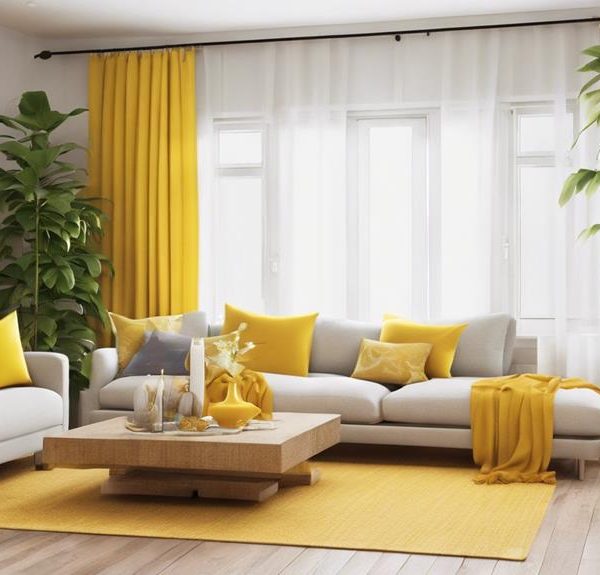
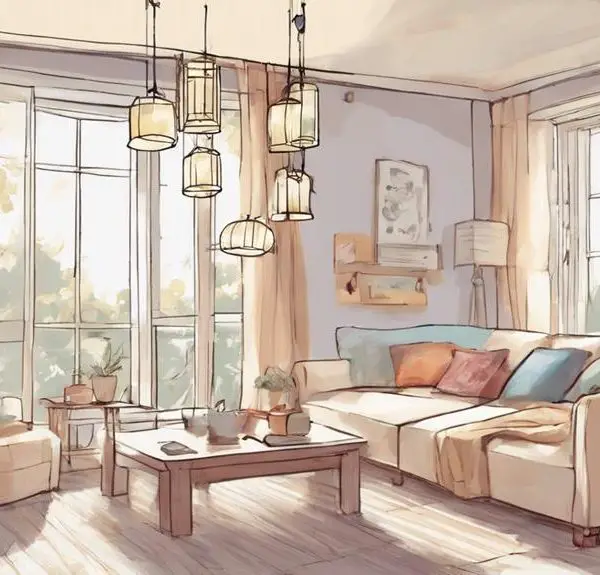
Sign up